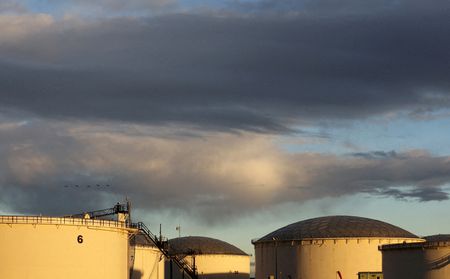 1
1 1
1

By Florence Tan
(Reuters) – Oil prices edged down on Wednesday, pressured by global central bank efforts to tame inflation and ahead of expected builds in U.S. crude inventories as product demand weakens.
Brent crude prices for September fell 37 cents, or 0.3%, to $106.98 a barrel by 0340 GMT, while U.S. West Texas Intermediate (WTI) crude for August slipped 69 cents, or 0.7%, to $103.53 per barrel. The WTI contract will expire later on Wednesday.
The more active September WTI contract was at $100.24 a barrel, down 50 cents.
Oil prices whipsawed in the previous session, caught in a tug-of-war between supply fears due to Western sanctions on Russia and pressures on indications from central bankers that they will raise interest rates to combat inflation.
Both contracts settled about 1% higher on Tuesday on tight supplies globally which have also kept the prompt Brent intermonth spreads in wide backwardation at about $4.40 a barrel. Front-month prices are higher than those in future months in a backwardated market, indicating tight supplies.
On Friday, open interest in New York Mercantile Exchange futures fell to their lowest since September 2015 as investors cut risky assets like commodities, worried that the Federal Reserve will keep raising U.S. interest rates.
“People have been switching out of Delta 1 products – just being long the futures or long via the index – into options because of the sharp pullback,” Stephen Innes, managing partner at SPI Asset Management, said in a note.
“They have changed from being completely exposed to the downside to exploring it via options, tending towards buying calls, call spreads, and selling puts.”
In the United States, crude stocks rose by about 1.9 million barrels for the week ended July 15, according to market sources citing American Petroleum Institute figures on Tuesday. That was close to the forecast for a rise of 1.4 million barrels in a Reuters poll.
Official weekly crude and fuel inventory data from the U.S. Energy Information Administration (EIA) is expected on Wednesday at 1530 GMT and traders are watching out for implied demand. [EIA/S]
The U.S. 3:2:1 and gasoline crack spreads – measures of refining profit margins – both fell to their lowest since April on Tuesday, indicating weaker fuel demand.
(Reporting by Florence Tan in Singapore and Laura Sanicola in New York; Editing by Shri Navaratnam)